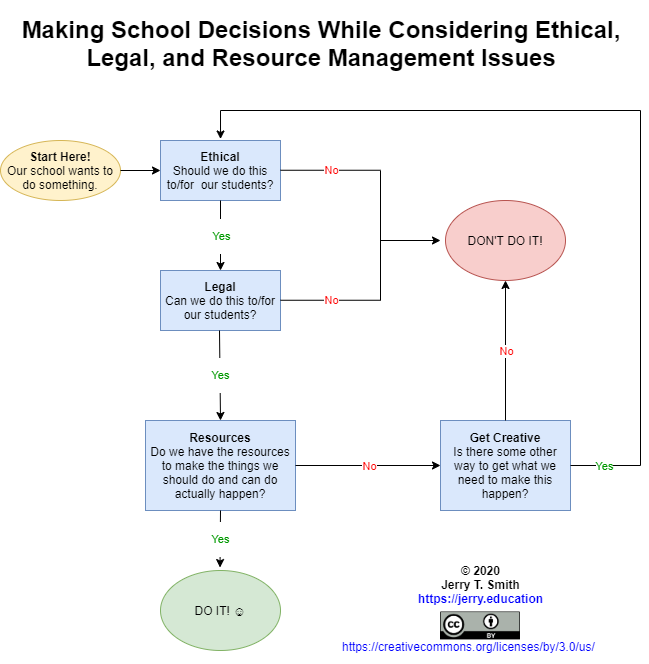I was recently interviewed (via email) and asked about how school ethics, legal issues, and resource management are related. Here was my response:
Ethics, legality, and resource management are certainly related. I would look at the three like this: 1) ethics asks the question, “Should we do this to our students?”; 2) legality posits, “Can we do this to our students without losing our jobs (or going to jail); and 3) resource management asks, “Do we have the resources to make the things we should do and can do actually happen?” If the answer to the ethical or legal questions “no,” then the idea, whatever it is, is a definite no-go. If those two pass muster and the only barrier is resources, then you can get creative to try to make the idea happen. It’s important that with each of these creative ideas to make it happen that you revisit the ethics and legal aspects to make sure your resource solution doesn’t create a “no” situation. See the flowchart for a visual representation of what I mean.

Ethical, Legal, and Resource issues have a huge impact on student learning. For example, consider fundraising for the general fund and for school clubs (i.e. Future Business Leaders of America, SkillsUSA, etc.) When I was younger, we sold pop, candy, food, and anything else people would buy at any time during the day to raise money for our clubs (I was really big in FBLA). Now, me and my students do not get that luxury due to it being illegal. And to do a good job running a club, you need money for travel, registration fees, and lodging for various events throughout the year. So, we instead do school-approved fundraisers such as Rada knives or beef jerky sales. This generates money but nothing to the extent that I was able to raise in high school selling candy to my classmates whenever I felt like it.
Another example of these three considerations is industry certification retakes. If you have one student that was only 5 points from passing and another that was 25 points from passing, is it ethical to allow the student who was closer to passing retake the test (which costs the school money) while not allowing the student who was further from passing to retest? We have cutoff scores in place to decide whether a student can retest, but sometimes there’s a student that’s not within that range and you know they could pass it if they took it again because the first time, for example, his grandpa had just died and he was very distracted. But you always ask yourself, how do we get to decide who to grant another chance to? What extenuating circumstances do we count toward a retake? Are any students being deprived because we didn’t deem their distraction worthy?
So, yeah, the three aspects needed to make decisions in schools of ethical, legal, and available resources come into play every single day. And the decisions we make about them are often not easy. But we do the best we know to do with the information we have and soldier on.